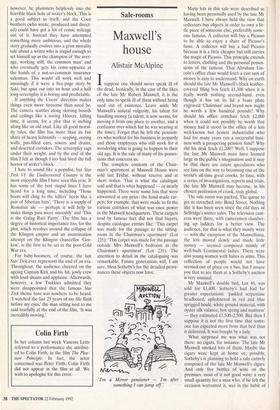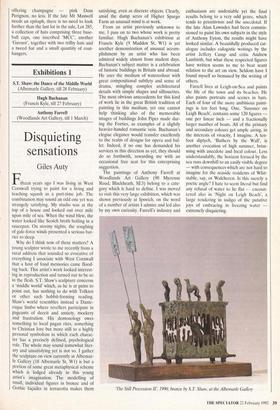Sale-rooms
Maxwell's house
Alistair McAlpine
Isuppose one should never speak ill of the dead. Ironically, in the case of the likes of the late Mr Robert Maxwell, it is the only time to speak ill of them without being sued out of existence. Leave aside Mr Maxwell's natural vulgarity, his talent for handling money (a talent, it now seems, for moving it from one place to another, and a confusion over which hat he was wearing at the time). Forget that he left the pension- ers who worked for his business in jeopardy and those employees who still work for it wondering what is going to happen in their old age. It is the sale of many of his posses- sions that concerns us.
The complete contents of the Chair- man's apartment at Maxwell House were sold last Friday, without reserve and at short notice. That is what the catalogue said and that is what happened — or nearly happened. There were some lots that were unwanted at any price: the hand-made car- pets, for example, that were made to fit the various corridors of what was once power in the Maxwell headquarters. These carpets trod by famous feet did not find buyers, despite catalogue entries like: 'This carpet was made for the passage to the sitting- room in the Chairman's apartment' (Lot 235); 'This carpet was made for the passage outside Mrs Maxwell's bedroom in the Chairman's apartment' (Lot 231). The attention to detail in the cataloguing was remarkable. Future generations will, I am sure, bless Sotheby's for the detailed prove- nances these objects now have.
`I'm a Mirror pensioner — I'm after something I can jump off.' Many lots in this sale were described as having been personally used by the late Mr Maxwell. I have always held the view that collectors buy objects in order to own a lit- tle piece of someone else, preferably some- one famous. A collector will buy a Picasso to be able to enjoy a share of Picasso's fame. A collector will buy a bad Picasso because it is a little cheaper but still carries the magic of Picasso. This principle extends to letters, clothing and the personal posses- sions of the famous. That Abraham Lin- coln's office chair would fetch a vast sum of money is easy to understand. Why on earth should the late Mr Maxwell's black leather- covered filing box fetch £1,300 when it is really worth nothing second-hand, even though it has on its lid a brass plate engraved 'Chairman' and brand new might be worth a few hundred pounds? Why should his office armchair fetch £2,000 when it could not possibly be worth that money had it stood in the office of a less well-known but honest industrialist who had for many years run a successful busi- ness with a prospering pension fund? Why did his desk fetch £1,200? Well, I suppose the late Mr Maxwell must have loomed large in the public's imagination and it may be that there are astute speculators who see him on the way to becoming one of the world's all-time great crooks. In time, with a series of investigations, reports and trials, the late Mr Maxwell may become, in his chosen profession of crook, truly global.
The sale-room was packed. The queue to get in stretched into Bond Street. Nothing like it has been seen since the old days of Selfridge's winter sales. The television cam- eras were there, with cameramen clamber- ing up ladders for a better view. The audience, for that is what they mostly were — with the exception of the Maxwelliana, the lots moved slowly and made little money — seemed composed mainly of well-built Continental ladies. There were also young women with babes in arms. This collection of people would not have seemed out of place on a bus, but I assure you that to see them at a Sotheby's auction is very unusual.
Mr Maxwell's double bed, Lot 46, was sold for £1,400. Sotheby's had had far greater expectations: 'padded serpentine headboard, upholstered in red and blue sprigged boule, white ground material, with oyster silk valance, box spring and mattress' — they estimated £1,500-2,500. But then I suppose it is not the first time that some- one has expected more from that bed than it delivered. It was bought by a lady.
What surprised me was what was not there: no cigars, for instance. The late Mr
Maxwell smoked lots of them. Maybe the cigars were kept at home or, possibly, Sotheby's is planning to hold a sale entirely composed of the late Mr Maxwell's cigars.
And only five bottles of wine on the premises, most of it not good wine: a very
small quantity for a man who, if he felt the occasion warranted it, was in the habit of
offering champagne — pink Dom Perignon, no less. If the late Mr Maxwell needs an epitaph, there is no need to look further than the last lot in the sale, Lot 285, a collection of hats comprising three base- ball caps, one inscribed 'MCC', another `Guvnor', together with two trilby hats and a tweed hat and a small quantity of coat- hangers.



















































 Previous page
Previous page